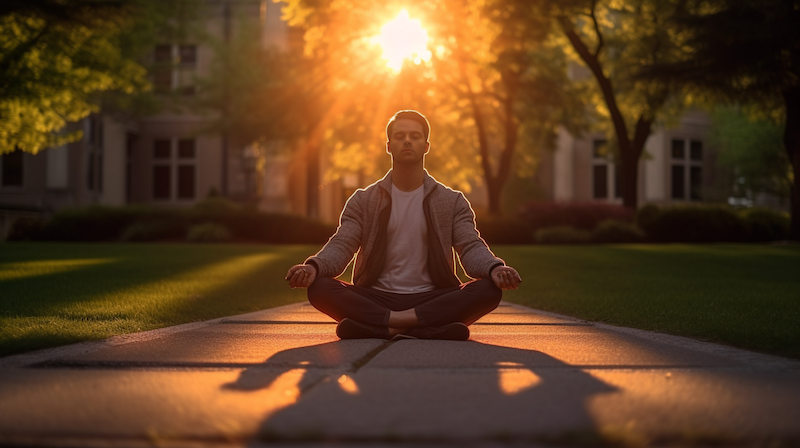
Sleep Tight and Stress Less: The Keys to Healthy Living for Busy Young Adults
Life as a young adult can be exciting but also very stressful. With school, jobs, relationships, and more to juggle, it’s easy to feel overwhelmed and exhausted. But getting enough restful sleep and managing stress effectively are crucial for maintaining your physical and mental health. In this blog post, we’ll explore some simple tips and habits to help you sleep better and stress less, so you can live your best life.
We’ve all been there – lying in bed staring at the ceiling, unable to fall asleep no matter how heavy our eyelids feel. Or suddenly jolting awake in the middle of the night, anxiously running through tomorrow’s to-do list. Quality sleep is essential, but as a busy young adult, it can be hard to wind down and truly rest. Start by developing a consistent pre-bedtime routine to cue your body that it’s time for sleep. Turn off screens an hour before bed, take a warm shower, read a book, or practice light stretches. Keeping your room cool, dark and quiet also signals to your brain that it’s time for bed. If you live with roommates, communicate quiet hours and compromise on optimal sleeping temperatures.
Once in bed, distracting thoughts may continue to race through your mind, preventing you from drifting off. When this happens, don’t become frustrated – simply observe these thoughts, then gently return your focus to your breathing. Visualize each inhale flowing in, each exhale flowing out, clearing your mind. If you still can’t fall asleep after 20 minutes, get out of bed, move to another room, and try a calming activity until you feel drowsy again, then return to bed. With practice, you can train your body to associate your bed with sleep.
We all have natural circadian rhythms that regulate sleep-wake cycles. Work with your body’s natural tendencies when possible instead of fighting them. If you’re a night owl, avoid early morning classes that disrupt your rhythm. Take power naps during the day if needed, but limit them to 30 minutes to avoid disrupting nighttime sleep. Set a regular sleep schedule, even on weekends, to anchor your rhythm. Limit caffeine after 2pm and avoid alcohol before bed, as both can negatively impact sleep quality.
Your daily habits, environment and mental state impact your ability to unwind at night. Avoid screens and stimulating activities right before bedtime. Discuss a sleep-friendly living environment with roommates. Set a calming atmosphere – dim lights, play relaxing music. Deal with stressors and worries earlier in the day through journaling, talking with friends, or taking breaks to move your body and clear your head. Listen to your mind and body – if you need more rest, go to bed earlier or sleep in when possible. Naps can help too, when limited appropriately.
Stress is an unavoidable part of life. But chronic, excessive stress taxes your mental and physical health. As a young adult, you may feel pressure to perform well at school, excel in your career, maintain an active social life, and live independently. Financial struggles, relationships, family issues, social media and current events all add more layers of stress. Without healthy coping strategies, it’s easy for this stress to become unmanageable.
Start by identifying your personal stressors and triggers. Notice when and why your stress levels spike – a big exam coming up, conflict with friends or family, loneliness or boredom? Awareness is key. Set boundaries and say no to nonessential obligations. Take study breaks to move your body. Spend time outdoors in nature. Share feelings with trusted confidants to gain perspective. Avoid unhealthy coping mechanisms like overeating, smoking, or drinking excessively – these provide temporary relief but ultimately add more stress.
Most importantly, make time for activities that genuinely recharge you. Exercise reduces cortisol and boosts endorphins. Creative hobbies like painting, writing, or playing music immerse you in the present moment. Practices like meditation, deep breathing, and yoga calm the mind. Don’t isolate yourself – spend time with positive people who energize you. Get enough sleep to replenish mentally and physically. Fuel your body properly with nutrient-dense whole foods. Hydrate and reduce caffeine and sugar. Take meaningful breaks from work and media. Be compassionate with yourself – you’re human and allowed to make mistakes! With daily priority on relaxation and joy, you’ll feel equipped to handle challenges.
The pressures of young adulthood can seem relentless, but getting sufficient sleep and managing stress will provide a foundation for health, happiness and personal growth. Start small – create a soothing bedtime routine, set a regular sleep schedule, take brief breaks to breathe during the day. Build healthy habits over time. Listen to your mind and body. For challenging moments, remember this wise advice from author Iyanla Vanzant: “When life gets too heavy, put down the weight.” Your well-being is the priority. Sleep tight and stress less, friend – you’ve got this!